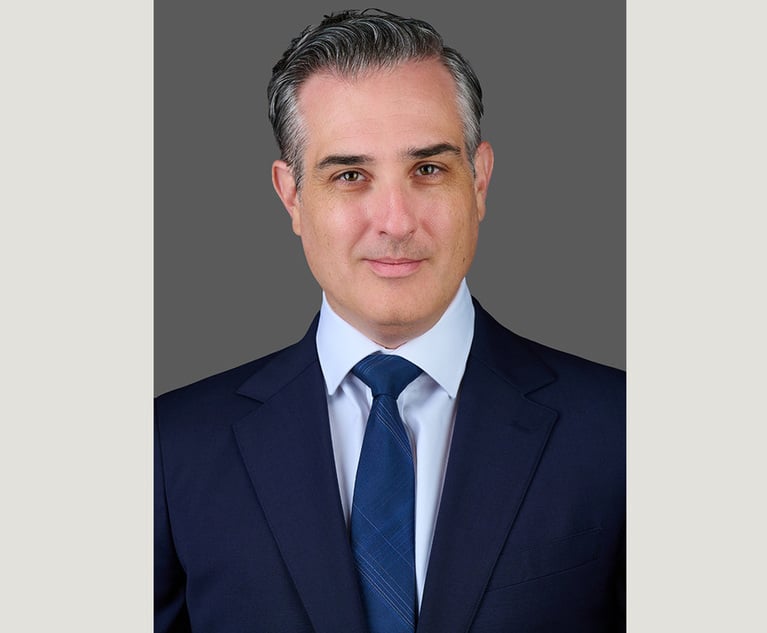Proposed Class Action Over Exploding Samsung Phones Won't Flame Out in Arbitration
U.S. District Judge Michael Ponsor on Monday denied Samsung's motions to either send the class action to arbitration, or dismiss the claims entirely.
May 21, 2018 at 06:11 PM
3 minute read
 Photo: Shutterstock
Photo: Shutterstock
A federal judge has denied Samsung's effort to arbitrate a proposed class action over allegations that one of its phones has a tendency to overheat and catch fire.
U.S. District Judge Michael Ponsor on Monday denied Samsung's motions to either send the class action to arbitration, or dismiss the claims entirely.
Although the phone maker had pushed for arbitration, noting that lead plaintiff Brittany Jones never opted out of the company's arbitration agreement, Ponsor said the agreement and opt-out language were too inconspicuously buried in the phone's informational manual to be enforceable.
“The degree of prominence of the arbitration agreement here seems calibrated with dual goals: on the one hand, just enough to persuade a court to smother potential litigation; on the other hand, not enough to make it likely that a consumer will actually notice the agreement and perhaps hesitate to buy,” Ponsor said. ”It is one thing to hold consumers to agreements they have not read; it is another to hold them to agreements that, perhaps by design, they will probably never know about.”
Ponsor sits on the U.S. District Court for the District of Massachusetts, but the case was assigned to him by the U.S. Court of Appeals for the Third Circuit.
According to Ponsor, Jones sued the device maker after her Samsung 3S allegedly overheated when it was charging in her mother's house and caught fire. The complaint said the incident eventually caused $10,000 in damage to the home. Jones brought strict liability, negligence, breach of warranty and negligent misrepresentation claims.
In response to the suit, Samsung sought to compel arbitration, or to dismiss the claims entirely.
The company noted that the phone came with an informational booklet, and contended that a sticker on the outside of the box the phone came in notified Jones about the significance of the booklet.
According to Ponsor, the arbitration agreement appeared on page 19 of the 64-page booklet, in a section regarding warranties. Along with saying that all disputes needed to be resolved at arbitration and that disputes couldn't be consolidated with other claims against Samsung, the booklet said the buyer had 30 days to opt out of the arbitration agreement, Ponsor said.
There was no dispute that Jones did not opt out of arbitration.
The company contended that Ponsor should follow the 1997 case in Hill v. Gateway 2000, in which the Seventh Circuit compelled arbitration despite a plaintiff's claims that he had not read the arbitration agreement.
Ponsor instead chose to follow precedent established in the Ninth Circuit's 2017 case Norcia v. Samsung Telecommunications America and the Third Circuit's decision from last year in Noble v. Samsung Electronics America. Those cases, Ponsor said, came to similar conclusions that an arbitration agreement that is ”buried inconspicuously” should not be enforceable.
“Defendant noted at argument that, if Samsung had wanted to make the arbitration agreement even more inconspicuous, it could have,” Ponsor said. “This is probably true, though it would not have been easy.”
Daniel Levin of Levin Sedran & Berman, who, along with Aaron Rihn of Robert Peirce & Associates, is representing Jones, said he was pleased with the ruling.
“We believe that the judge decided correctly,” Levin said.
Arnold & Porter Kaye Scholer attorney Robert Katerberg, who is representing Samsung, did not return a call seeking comment Monday afternoon.
This content has been archived. It is available through our partners, LexisNexis® and Bloomberg Law.
To view this content, please continue to their sites.
Not a Lexis Subscriber?
Subscribe Now
Not a Bloomberg Law Subscriber?
Subscribe Now
NOT FOR REPRINT
© 2025 ALM Global, LLC, All Rights Reserved. Request academic re-use from www.copyright.com. All other uses, submit a request to [email protected]. For more information visit Asset & Logo Licensing.
You Might Like
View All

'Taking the Best' of Both Firms, Ballard Spahr and Lane Powell Officially Merge
6 minute read

Trending Stories
- 1The Importance of Contractual Language in Analyzing Post-Closing Earnout Disputes
- 2People in the News—Jan. 8, 2025—Stevens & Lee, Ogletree Deakins
- 3How I Made Partner: 'Avoid Getting Stuck in a Moment,' Says Federico Cuadra Del Carmen of Baker McKenzie
- 4Legal Departments Dinged for Acquiescing to Rate Hikes That 'Defy Gravity'
- 5Spalding Jurors Return $12M Verdict Against State Farm Insurance Client
Who Got The Work
Michael G. Bongiorno, Andrew Scott Dulberg and Elizabeth E. Driscoll from Wilmer Cutler Pickering Hale and Dorr have stepped in to represent Symbotic Inc., an A.I.-enabled technology platform that focuses on increasing supply chain efficiency, and other defendants in a pending shareholder derivative lawsuit. The case, filed Oct. 2 in Massachusetts District Court by the Brown Law Firm on behalf of Stephen Austen, accuses certain officers and directors of misleading investors in regard to Symbotic's potential for margin growth by failing to disclose that the company was not equipped to timely deploy its systems or manage expenses through project delays. The case, assigned to U.S. District Judge Nathaniel M. Gorton, is 1:24-cv-12522, Austen v. Cohen et al.
Who Got The Work
Edmund Polubinski and Marie Killmond of Davis Polk & Wardwell have entered appearances for data platform software development company MongoDB and other defendants in a pending shareholder derivative lawsuit. The action, filed Oct. 7 in New York Southern District Court by the Brown Law Firm, accuses the company's directors and/or officers of falsely expressing confidence in the company’s restructuring of its sales incentive plan and downplaying the severity of decreases in its upfront commitments. The case is 1:24-cv-07594, Roy v. Ittycheria et al.
Who Got The Work
Amy O. Bruchs and Kurt F. Ellison of Michael Best & Friedrich have entered appearances for Epic Systems Corp. in a pending employment discrimination lawsuit. The suit was filed Sept. 7 in Wisconsin Western District Court by Levine Eisberner LLC and Siri & Glimstad on behalf of a project manager who claims that he was wrongfully terminated after applying for a religious exemption to the defendant's COVID-19 vaccine mandate. The case, assigned to U.S. Magistrate Judge Anita Marie Boor, is 3:24-cv-00630, Secker, Nathan v. Epic Systems Corporation.
Who Got The Work
David X. Sullivan, Thomas J. Finn and Gregory A. Hall from McCarter & English have entered appearances for Sunrun Installation Services in a pending civil rights lawsuit. The complaint was filed Sept. 4 in Connecticut District Court by attorney Robert M. Berke on behalf of former employee George Edward Steins, who was arrested and charged with employing an unregistered home improvement salesperson. The complaint alleges that had Sunrun informed the Connecticut Department of Consumer Protection that the plaintiff's employment had ended in 2017 and that he no longer held Sunrun's home improvement contractor license, he would not have been hit with charges, which were dismissed in May 2024. The case, assigned to U.S. District Judge Jeffrey A. Meyer, is 3:24-cv-01423, Steins v. Sunrun, Inc. et al.
Who Got The Work
Greenberg Traurig shareholder Joshua L. Raskin has entered an appearance for boohoo.com UK Ltd. in a pending patent infringement lawsuit. The suit, filed Sept. 3 in Texas Eastern District Court by Rozier Hardt McDonough on behalf of Alto Dynamics, asserts five patents related to an online shopping platform. The case, assigned to U.S. District Judge Rodney Gilstrap, is 2:24-cv-00719, Alto Dynamics, LLC v. boohoo.com UK Limited.
Featured Firms
Law Offices of Gary Martin Hays & Associates, P.C.
(470) 294-1674
Law Offices of Mark E. Salomone
(857) 444-6468
Smith & Hassler
(713) 739-1250





